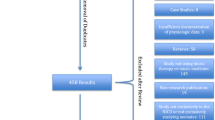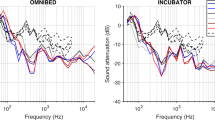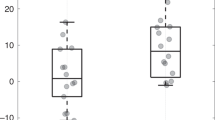Abstract
Excessive sound is an acknowledged problem in neonatal intensive care units (NICUs); however, there is relatively little objective information about the effects of sound on the newborn. The cardiovascular and respiratory systems have been the most extensively studied systems. The patterns of response in these systems may be influenced by a variety of factors, including: the intensity of the sound, the infant's behavioral state, the infant's maturity and postnatal age, and the perinatal history. This article reviews the known cardiovascular, respiratory, and other physiological effects of sound on neonates.
This is a preview of subscription content, access via your institution
Access options
Subscribe to this journal
Receive 12 print issues and online access
$259.00 per year
only $21.58 per issue
Buy this article
- Purchase on Springer Link
- Instant access to full article PDF
Prices may be subject to local taxes which are calculated during checkout
Similar content being viewed by others
Author information
Authors and Affiliations
Rights and permissions
About this article
Cite this article
Morris, B., Philbin, M. & Bose, C. Physiological Effects of Sound on the Newborn. J Perinatol 20 (Suppl 1), S55–S60 (2000). https://doi.org/10.1038/sj.jp.7200451
Published:
Issue Date:
DOI: https://doi.org/10.1038/sj.jp.7200451
This article is cited by
-
Recommended standards for newborn ICU design
Journal of Perinatology (2023)
-
Comparing light and noise levels before and after a NICU change of design
Journal of Perinatology (2021)
-
Sound Interferes with the Early Tactile Manual Abilities of Preterm Infants
Scientific Reports (2016)
-
Les unités de néonatologie, un environnement inhospitalier ? Perceptions et attentes sensorielles du nouveau-né prématuré hospitalisé
Revue de médecine périnatale (2016)
-
The characterization of noise levels in a neonatal intensive care unit and the implications for noise management
Journal of Environmental Health Science and Engineering (2014)



